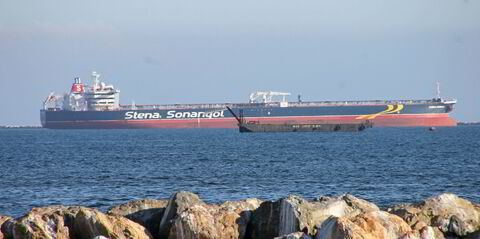Qi, the safety rating system developed by vessel vetting company RightShip, is at the centre of an online debate over the application of big data analytics in ship safety assessments.
Qi employs big data and predictive analytics to come up with a safety rating for ships and it has become one of the most influential factors in dry bulk chartering markets.
The online discussion was started by Hamburg-based TMS Ship Management head of newbuilding Ian Thompson on his LinkedIn page, which has so far generated more than 26,000 views.
The popularity of the debate reflects the growing importance placed by the industry on ship safety rating systems.
Thompson questions the use of predictive analytics in rating ship safety after one of his company’s vessels was downgraded by Qi for, he claims, following the correct safety procedures.
The vessel had developed an engine oil leak in a busy traffic lane, says Thompson. The crew followed the correct procedure by immediately reporting the incident to traffic area control. The vessel then left the shipping lane for safe anchorage, where the fault was repaired within an hour.
However, Thompson says that by declaring the problem to the authorities, it led to the ship being automatically downgraded by RightShip’s Qi.
Thompson said: “Later we saw that the vessel had been downgraded by the Rightship’s, fully automated rating system, by an algorithm! We then have to jump through hoops to get the vessel back to its five stars. During this period, when we were at three stars, chartering opportunities and better rates passed us by."
"And absolutely 'nothing can be changed, as it's fully automated' we are told," he added. "So, in effect, we were financially penalised for doing a good job."
Thompson now fears that the use of automated ratings will encourage shipmanagers to hide rather than report faults in the future.
But RightShip chief executive Warwick Norman has now rebutted the claims on the company’s LinkedIn page.
Norman told TradeWinds that it was not simply an issue of algorithms, RightShip’s original system had also downgraded a vessel two stars for casualty reporting.
And he says that under either system the downgrade would only apply until an incident is “closed out”.
“Close out can happen at anytime and is free of charge. This process can be dealt with efficiently once corrective action is communicated to us from the owner or manager,” Norman said.
“From our records the incident occurred on the 19 December. The assertion that they [TMS] made significant efforts to contact us are not correct.
"We had no communication with his [Thompson's] organisation until we initiated contact with it on the 4 May. Following our request for information, the incident was closed out early next morning.
"So, as you can see, this close out process can be quite swift once we are contacted,” he added.
Norman stresses that he has “absolute confidence” in the system, which has been “independently verified” and is “rigorously tested and continuously updated”.
Yet the use of such analytics in ship safety ratings is proving a contentious issue, judging by the comments posted on Thompson’s LinkedIn page.
One contributor says she fears inexperienced big data application providers entering the shipping markets.
“As an industry we need to be more critical of what is put on the table before us and take time to evaluate [it] before buying into the next — dare I say — fad," she said.
Another contributor points out the need to find a way of accounting for human behaviour in algorithms. “An adequate human reaction needs to find its appreciation in this algorithm rather than punishment. It has to be accepted by all stakeholders that such incidents occur and that the reaction to it needs to be evaluated,” he said.



